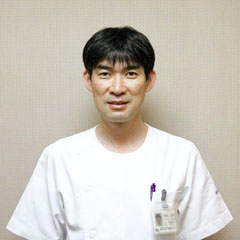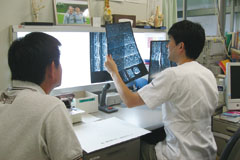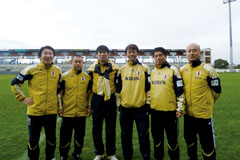SPORTS YOKOHAMA Vol.36 : Feature(2/5)

Dr. Kuniaki Shimizu of the Yokohama Sports Medical Center, who works in the Department of Orthopedic Surgery, has treated many injured athletes. He also served as the team doctor for Japan’s national soccer team from 1998. In 2010, he went with the team to South Africa where the World Cup was held. Currently, Dr. Shimizu is the team doctor for Yokohama B-Corsairs of the bj League (Japanese professional basketball league) as well.
Dr. Shimizu has frequent contact with athletes. What does he think important in treating athletes?

Kuniaki Shimizu, head of the Department of Orthopedic
Surgery of the Yokohama Sports Medical Center

Dr. Shimizu (right) making a diagnosis at the Yokohama Sports Medical Center 
When the World Cup was held in South Africa, Dr. Shimizu (third from left) went there with the national soccer team as the team doctor.
As a Doctor of the Sports Medical Center
Young people from primary school pupils to college students come to the Sports Medical Center and, of course, many of them play soccer or baseball. But some patients engage in other kinds of sports. What we mainly do at the medical center is treat injuries, of course. But many of our athletic patients are particularly anxious to know when they will be able to return to competition.
We doctors understand how these patients feel. But allowing them to return to competition before complete recovery can worsen the injury. So we first ask the patient when he or she wants to return to competition and then discuss the timing of return with the patient while informing him or her about the severity of the injury and the risk of premature return.
Sports doctors, who frequently treat athletic injuries, can roughly estimate when a patient can return to competition. We can also tell patients what kind of exercise they can do and cannot do before the injury heals. We do these things by working with physical therapists.
As a Team Doctor
I traveled with the Japanese national soccer team as the team doctor from 1998. My job was to diagnose the injuries of the players and tell the manager about my diagnoses.
Unlike in the hospital, you need to evaluate the condition of injury immediately on the ground, and there is no time to see how the injury progresses. If an injured player cannot play in a game or tournament where he is scheduled to play, he needs to be replaced by another player. So I always had to make a quick evaluation.
When players are summoned to the national team, you talk with the team doctors of their clubs about their injuries and, if necessary, diagnose them yourself. You need to judge whether a player is fit enough to play in a game. If you find that letting him play can worsen the injury and have a negative impact on his future play, you should inform the manager.
I feel really happy to see an injured player I treated, whether as a team doctor or as a hospital doctor, recover from the injury, return to competition and play well. It gives me a sense of achievement.

Dr. Kuniaki Shimizu of the Yokohama Sports Medical Center, who works in the Department of Orthopedic Surgery, has treated many injured athletes. He also served as the team doctor for Japan’s national soccer team from 1998. In 2010, he went with the team to South Africa where the World Cup was held. Currently, Dr. Shimizu is the team doctor for Yokohama B-Corsairs of the bj League (Japanese professional basketball league) as well.
Dr. Shimizu has frequent contact with athletes. What does he think important in treating athletes?

Kuniaki Shimizu, head of the Department of Orthopedic
Surgery of the Yokohama Sports Medical Center

Dr. Shimizu (right) making a diagnosis at the Yokohama Sports Medical Center 
When the World Cup was held in South Africa, Dr. Shimizu (third from left) went there with the national soccer team as the team doctor.
As a Doctor of the Sports Medical Center
Young people from primary school pupils to college students come to the Sports Medical Center and, of course, many of them play soccer or baseball. But some patients engage in other kinds of sports. What we mainly do at the medical center is treat injuries, of course. But many of our athletic patients are particularly anxious to know when they will be able to return to competition.
We doctors understand how these patients feel. But allowing them to return to competition before complete recovery can worsen the injury. So we first ask the patient when he or she wants to return to competition and then discuss the timing of return with the patient while informing him or her about the severity of the injury and the risk of premature return.
Sports doctors, who frequently treat athletic injuries, can roughly estimate when a patient can return to competition. We can also tell patients what kind of exercise they can do and cannot do before the injury heals. We do these things by working with physical therapists.
As a Team Doctor
I traveled with the Japanese national soccer team as the team doctor from 1998. My job was to diagnose the injuries of the players and tell the manager about my diagnoses.
Unlike in the hospital, you need to evaluate the condition of injury immediately on the ground, and there is no time to see how the injury progresses. If an injured player cannot play in a game or tournament where he is scheduled to play, he needs to be replaced by another player. So I always had to make a quick evaluation.
When players are summoned to the national team, you talk with the team doctors of their clubs about their injuries and, if necessary, diagnose them yourself. You need to judge whether a player is fit enough to play in a game. If you find that letting him play can worsen the injury and have a negative impact on his future play, you should inform the manager.
I feel really happy to see an injured player I treated, whether as a team doctor or as a hospital doctor, recover from the injury, return to competition and play well. It gives me a sense of achievement.
 ハマスポ
ハマスポ
 お知らせ&トピックス
お知らせ&トピックス ページトップへ戻る
ページトップへ戻る ページトップへ戻る
ページトップへ戻る

